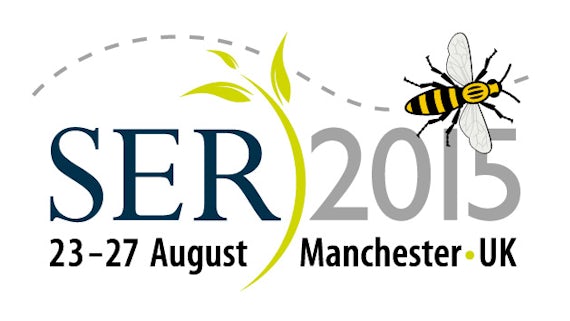Society for Ecological Restoration International Conference 2015
25 Awst 2015

In August, the Society for Ecological Restoration (SER) World Conference is took place in Manchester . The Society for Ecological Restoration (SER) is a non-profit organization whose mission is to promote ecological restoration to sustain the diversity of life on Earth and re-establish an ecologically healthy relationship between nature and culture. SER’s primary focus is to advance the science and practice of ecological restoration,to recover biodiversity and ecosystem services to thereby address the most pressing environmental challenges facing humanity and the biosphere.
The conference's title “Towards resilient ecosystems: restoring the urban, the rural and the wild” was of interest to a broad range of people including those working in highly urbanised, ex-agricultural, or natural wild environments. The conference showcased important scientific developments, issues and solutions, and showed the cultural, educational and artistic aspects of restoration ecology.
Professor Susan Baker, Co-director in the Sustainable Places Research Institute and Ella Furness, Sustainable Places PhD Research Student presented their work during the conference. Ella presented her talk entitled “What is the place of human values in restoring environments?" during the Sustainable Communities workshop. The presentation looked at Ella's research exploring the nature of participatory restoration work, how it is carried out, participants’ experiences, understandings and reflections on restoration and its impacts upon them.
Susan spoke about the social-economic attributes of restoration success. She also presented a poster, "Political Science Analysis of Ecological Restoration Policy and Practice" based on a recent paper published in Environmental Politics. The paper looked at how ecological restoration has taken on a new significance in the face of climate change and biodiversity loss. Despite its growing policy salience however, the social and political sciences have paid limited attention to the study of ecological restoration policy and practice. Susan drew on the political science study of multilevel governance, institutions, power relations, and place-based politics and provided a flavour of how a political science engagement could also contribute to the analysis of ecological restoration.
The conference covered the breadth of work occurring throughout the world by academics and practitioners. Lectures by Dr. John Rodwell and by Alan Watson-Featherstone presented the challenges and hopes for the future of restoration. They looked at land management practices and different ways of managing land for biodiversity. John spoke about the importance of understanding local peoples knowledge of landscapes and how their practices shape biodiversity. Alan emphasised the necessity of restoring a relationship between people and nature.
Ella enjoyed many of the sessions including Dr. Zhang's research looking at the impacts of urbanisation and social change in China. She was also interested in a session by Dr. Liira of Tartu University in Estonia, who spoke about how grand rural manors in Estonia have become sites of biodiversity since the collapse of communism. Ella was facinated by Phd candidate Patrick Augenstein's research. Patrick presented his work on the changing forest landscape in Rwanda, having interviewed people about their memories of forests and national parks and compared historical photos of landscapes in Rwanda to new photos taken this year to show the change in landscape.
